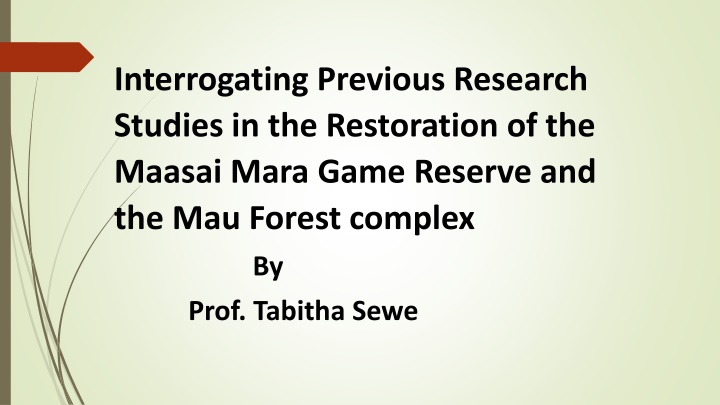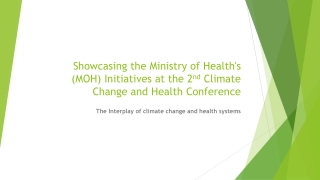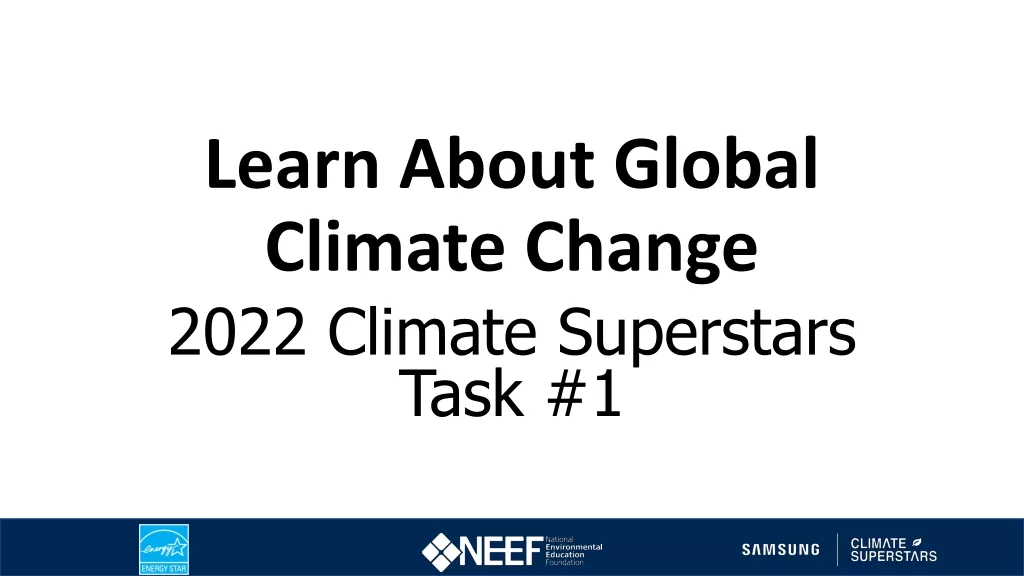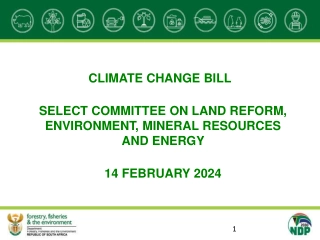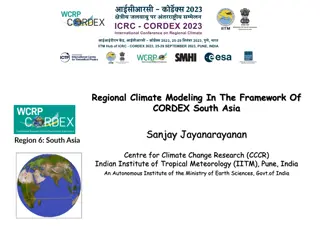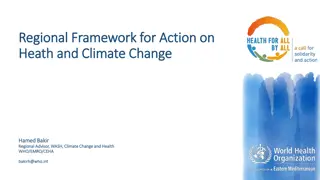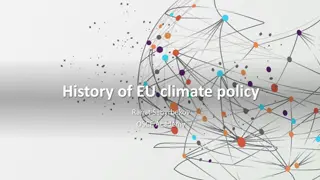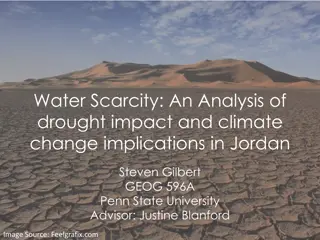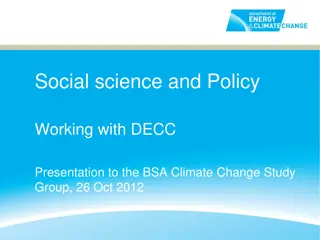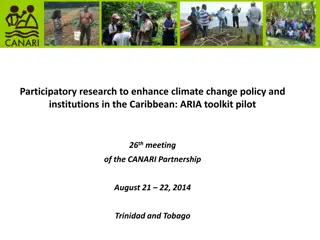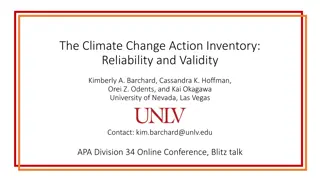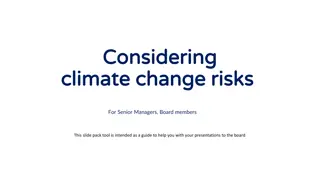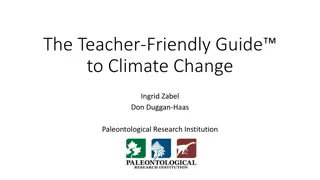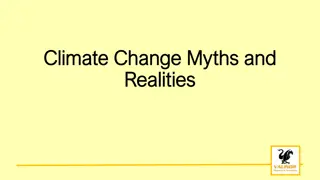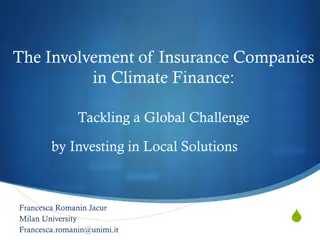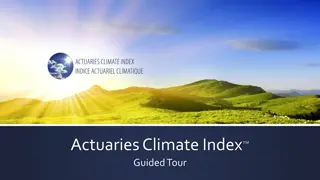Climate Change Policy Framework Overview
Recognizing climate change as a sustainable development issue, this policy framework for S.I. aims to integrate considerations into national strategies, enhance resilience, and reduce GHG emissions. It outlines objectives, commitments, and guiding principles.
Download Presentation

Please find below an Image/Link to download the presentation.
The content on the website is provided AS IS for your information and personal use only. It may not be sold, licensed, or shared on other websites without obtaining consent from the author.If you encounter any issues during the download, it is possible that the publisher has removed the file from their server.
You are allowed to download the files provided on this website for personal or commercial use, subject to the condition that they are used lawfully. All files are the property of their respective owners.
The content on the website is provided AS IS for your information and personal use only. It may not be sold, licensed, or shared on other websites without obtaining consent from the author.
E N D
Presentation Transcript
Interrogating Previous Research Studies in the Restoration of the Maasai Mara Game Reserve and the Mau Forest complex By Prof. Tabitha Sewe
INTRODUCTION The Mara ecosystem is threatened by human encroachment and activities. Scholars have undertaken various researches on the Mara Ecosystems with a view to making recommendations to facilitate the restoration of the ecosystem. This study seeks to interrogates previous researches on the restoration of the Maasai Mara Game Reserve with a view to establishing the current status of research, identify gaps and propose a structured way of conducting future research on the Mara ecosystem
METHODOLOGY The study used desk top research 50 previous researches on the Mara were collected through Google searches. The study adopted a content analysis method with a view of classifying the researches into the following: a) Research themes b) Research findings and Recommendations c) Recommendations status and gaps
RESEARCH THEMES- ECOLOGICAL MANAGEMENT OF ECOSYSTEMS THEMES SUB THEME SPECIFIC AREA OF STUDY Ecological Management of ecosystems Community Management of Forests Rationale for establishment of Loita EthnoBotany Centre Water Management of Ecosystems Waste Management of the Mara River Basin Assessing Reserve Flows of the Mara River Analysis of long-term land use/cover changes and wildlife population dynamics using remote sensing techniques Management through Technology: Remote Sensing
ECONOMIC ANALYSIS OF ECOSYSTEMS THEMES Economic Analysis of Ecosystems SUB THEMES Property Rights in Relation to Wildlife SPECIFIC AREA Economic analysis of wildlife conservation options in Kenya (1996) Cost Benefit Analysis of Tourism Negative impacts of tourism activity especially off road driving (2014) Economic benefits of wildlife to communities in Africa Why wildlife has not benefitted communities in Africa Economic impacts of climate change to ecosystems Review of economic impacts of climate change in relation to Mau ecosystems. Rights of the communities to benefit from the developmental potential of their land through loss of biodiversity Community Rights in the Ecosystems
WILDLIFE POPULATION MANAGEMENT AND KNOWLEDGE THEME Wildlife Population Management and Knowledge SUBTHEME Elephants and Buffaloes SPECIFIC TOPIC Aerial total counts of elephants and buffaloes in the Serangeti-Mara ecosystems (2010) Stautus of the black rhinoceros in the Masai Mara National reserve, Kenya. Black Rhinocreous Cheetah Conseration efforts for the Cheetah Contrasting Density and Demography of Animals 13 wild and three domestic large herbivores between the Masai Mara National Reserve and the adjoining pastoral ranches Knowledge of Wildebeestes Maasai knowledge articulations on the knowledge of wildebeest (2005)
HUMAN WILDLIFE CONFLICT THEME Human Wildlife Conflict SUB THEME Human Lion Conflict SPECIFIC TOPIC Lions killed in retaliation attacks on livestock Addressing Maasai-Lion (Panthera Leo) Conflict in Kenya s Loita Forest with an Adaptive Management Tool Human Elephant,Rhinocerous Conflict Elephant and rhinoceros conflict destruction and human injuries
FLORA IN THE ECOSYSTEM THEME Flora in the Ecosystem SUB THEME Grasslands SPECIFIC TOPIC Global ecosystems with focus on grasslands Effect of land use system on Arbuscular Mycorrhiza fungi in Maasai Mara ecosystem, Kenya . Effect of Human Activities on Fauna in the Ecosystem
THREATS ON ECOSYSTEMS THEME Threats on Ecosystems SUB THEME Protected Parks SPECIFIC TOPIC Relative severity of threats and how serious protected parks are threatened (Kiringe and Okello,2009) The impacts of urbanization driven land use changes within the Mara river basin Mara River Basin
LANGUAGE AND ECOSYSTEMS THEME Language and Ecosystems SUBTHEME Effect of ecological destruction on languages SPECIFIC TOPIC Effect of environment changes, culture on language lexicon
CONSERVATION POLICIES ON ECOSYSTEMS THEME Conservation Policies on Ecosystems SUBTHEME Policy Failures SPECIFIC TOPIC Prohibition on consumptive use of wildlife, use of land within protected areas without the ability to enforce compliance. Policy Integration Integration of Policies with Economic Development Policy
ANALYSIS OF RESEARCH FINDINGS AND RECOMMENDATIONS RESEARCH TOPIC FINDINGS Community Management of Forests RECOMMENDATIONS AND STATUS Loita Ethno botany Centre be established to support education, planning and research towards sustainable management of the forest. Wildlife Knowledge The studies expose the situatedness, strengths, and weaknesses of both Maasai knowledge and scientific knowledge The major culprits of waste disposal and pollution are camps and lodges. Reduced population of Wildlife Population Acceptance of both knowledge is desirable in conservation Waste Management in the Mara River Basin Involvement of camps and lodges in waste management Aerial Counts of Elephants and Buffaloes Anti-poaching efforts should be intensified. Communities to be involved in management of ecosystems
ANALYSIS OF RESEARCH FINDINGS AND RECOMMENDATIONS TOPIC FINDINGS RECOMMENDATIONS AND STATUS Threats on protected parks Threats stemmed from bush meat trade; poaching for trophies; human wildlife conflicts; human population encroachment; loss of migration corridors and dispersal areas. attribute policy failures which focus on prohibition on consumptive use of wildlife, use of land within protected areas without the ability to enforce compliance. Policy Failures recommend policies that are wider in scope and use a broad range of financial, economic and market instruments and integration with the economic development policy
GAPS IN RESEARCH AREAS The management of ecosystem studies have not captured the fusion of global approaches with community s perceptions of management of ecosystems' or home grown solutions . The interdisciplinary approach to management of ecosystems is conspicuously missing. A majority of the studies pursue a disciplinary based approach to management of the ecosystems. The language and ecology studies have not adequately captured discourses that are ecologically destructive and those that help to promote and protect conditions that support life. This is an area that is seriously under researched yet the subtle discourses encourage ecological destruction
CONCLUSION a) The following research areas were identified: Ecological management of ecosystems Economic analysis of ecosystems Wildlife population management and knowledge Fauna in the ecosystems Threats on the ecosystems Language and the ecosystems Conservation policies in the ecosystems
CONCLUSION The analysis of recommendations and findings reveal the following: The findings reveal ecological destruction of the Mau ecosystem and need for urgent measures to be taken to reverse the trend. The research findings are not shared with communities supposed to participate in the management of ecosystems. There is lack of coordinated approach to the research of Mara Ecosystems with research being undertaken by government, research institutions,Universities,NGOs but no coordination with the implementation bodies which are National and County Governments. The absence of coordination between the research institutions and implementation agencies makes it difficult to establish the implementation status of the research recommendations.
CONCLUSION The gaps in the research areas reveal Absence interdisciplinary approaches by scholars in the conservation of Mau Ecosystem Absence of home grown approaches to management of ecological systems Lack of emphasis on the potential of language to promote or destroy ecosystems
RESEARCH RECOMMENDATIONS That there is need for joint forum for all the research conducted on the Mara system for sharing of information. Units be established within ministries in the National and County governments to coordinate, collect and collate research undertaken by Universities and research institutions. The research institutions develop avenues for sharing of research information with communities involved in ecological management.
